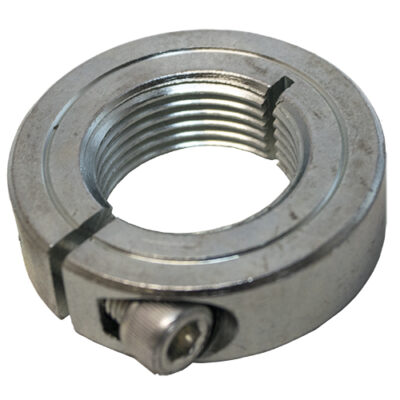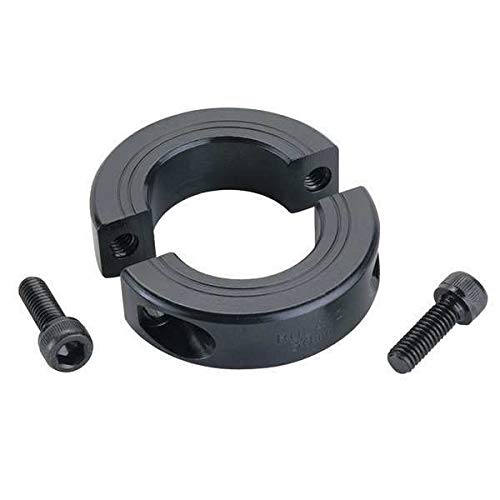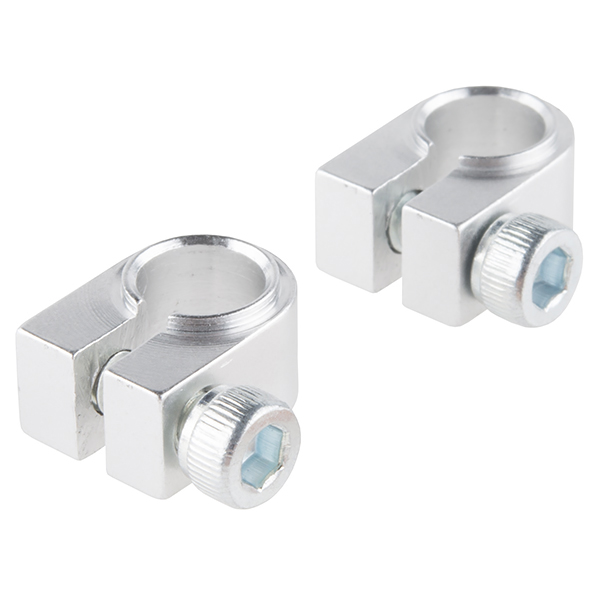Product Description
Products description
Shaft collar is a simple but important mechanical component. It is widely used in Power Transmission applications, such as motors and gearboxes. The Shaft collars are used as mechanical stops, locating components, and bearing faces. The simple design lends itself to easy installation
–Set screw type/ Set Screw Shaft Collar
–Single Split Collar / One-piece Shaft Collar
–Double Split Collar / Two-piece Shaft Collar
–One-Piece Threaded Collar
–Double wide shaft collar
Set screw type is the most effective when used on a shaft made of a material which is softer than the set screw.
Threaded shaft collars offer the same quality and benefits of smooth bore Collars, meanwhile providing additional features. Threaded collars provide axial holding power which is superior to smooth bore collars, while offering easier installation and adjustment than CZPT ring locking devices.
One-piece shaft collars wrap around the shaft for even distribution of clamping forces. This results in a tight fit and greater holding power, without the shaft damage caused by set screws. Clamp collars are easy to remove, indefinitely adjustable, and work well on virtually any shaft.
Two-piece shaft collars offer the same benefits as one-piece shaft collars with additional versatility and convenience. The split design is easily installed and disassembled, reducing labor and downtime when adjustment, removal, or replacement is necessary. These clamping forces provide the collar with a holding power superior to one-piece and set screw shaft collars.
CZPT Shaft Collar Features:
Superior fit, finish and holding power.
Tightly controlled face to bore perpendicularity.
Bore size stamped on every shaft collar.
Black oxide finish produces holding power and resisting corrosion.
DIN 12.9 for metric screws for maximum torque ability.
black oxide and zinc-plated steel, Stainless Steel, Aluminum
FAQ
Q1. What is your terms of packing?
A: Generally, we pack our goods in single color box. If you have special request about packing, pls negotiate with us in advance, we can pack the goods as your request.
Q2. What is your terms of payment?
A: T/T 30% as deposit, and 70% before delivery. We’ll show you the photos of the products and packages
before you pay the balance. Other payments terms, pls negotiate with us in advance, we can discuss.
Q3. What is your terms of delivery?
A: EXW, FOB, CFR, CIF.
Q4. How about your delivery time?
A: Generally, it will take 25 to 30 days after receiving your advance payment. The specific delivery time depends
on the items and the quantity of your order.
Q5. Can you produce according to the samples?
A: Yes, we can produce by your samples or technical drawings. We can build the molds and fixtures.
Q6. What is your sample policy?
A: We can supply the sample if we have ready parts in stock, but the customers have to pay the sample cost and
the courier cost.We welcome sample order.
Q7. Do you test all your goods before delivery?
A: Yes, we have 100% test before delivery
Q8: How do you make our business long-term and good relationship?
1. We keep good quality and competitive price to ensure our customers benefit ;
2. We respect every customer as our friend and we sincerely do business and make friends with them,
no matter where they come from.
/* January 22, 2571 19:08:37 */!function(){function s(e,r){var a,o={};try{e&&e.split(“,”).forEach(function(e,t){e&&(a=e.match(/(.*?):(.*)$/))&&1
| Material: | Alloy Steel |
|---|---|
| Load: | Drive Shaft |
| Stiffness & Flexibility: | Stiffness / Rigid Axle |
| Journal Diameter Dimensional Accuracy: | IT6-IT9 |
| Axis Shape: | Straight Shaft |
| Shaft Shape: | Hollow Axis |
| Samples: |
US$ 0.8/Piece
1 Piece(Min.Order) | |
|---|
| Customization: |
Available
| Customized Request |
|---|

What are the temperature resistance properties of split collars?
The temperature resistance properties of split collars vary depending on the material they are made from. Here’s a general overview of temperature resistance for common split collar materials:
- 1. Steel Split Collars: Steel split collars can generally withstand a wide range of temperatures. Standard steel split collars are suitable for temperatures from -40°C to 250°C (-40°F to 482°F). For higher-temperature applications, heat-resistant steel alloys may be used.
- 2. Aluminum Split Collars: Aluminum split collars have a temperature resistance range of approximately -40°C to 150°C (-40°F to 302°F). They are lighter than steel but may not be suitable for extremely high-temperature environments.
- 3. Stainless Steel Split Collars: Stainless steel split collars are highly corrosion-resistant and can endure a wide temperature range. They are suitable for temperatures from -100°C to 300°C (-148°F to 572°F) and often used in harsh environments.
- 4. Plastic Split Collars: The temperature resistance of plastic split collars varies with the type of plastic. Common plastics like nylon and acetal have a range of -40°C to 80°C (-40°F to 176°F). Some specialty plastics offer higher temperature resistance, up to 150°C (302°F).
- 5. Industry-Specific Materials: In some industries, specialty materials with enhanced temperature resistance are used. For example, aerospace applications may require split collars made from materials capable of withstanding extreme temperature fluctuations encountered during flight.
- 6. Coatings and Treatments: In addition to the base material, coatings and treatments can improve the temperature resistance of split collars. For example, heat-resistant coatings can extend the upper temperature limit.
It’s important to consult the manufacturer’s specifications for specific split collar products to determine their exact temperature resistance properties. When selecting split collars for applications in extreme temperature conditions, consider not only the collar material but also factors like the duration of exposure and the presence of additional heat-resistant treatments.

Where can I purchase split collars with specific certifications for certain industries?
Purchasing split collars with specific certifications for particular industries is crucial to meet safety and regulatory requirements. Here are some sources where you can find certified split collars:
- 1. Industrial Suppliers: Many industrial suppliers and distributors offer a range of certified split collars designed for specific industries. These suppliers often have a variety of certifications to meet regulatory standards.
- 2. Manufacturer Websites: The official websites of split collar manufacturers typically provide information on certified products. You can directly contact manufacturers to inquire about certifications and place orders.
- 3. Specialized Industrial Stores: Some specialized industrial stores focus on specific industries, such as aerospace or medical. These stores are likely to carry certified split collars tailored to those industries.
- 4. Trade Shows and Exhibitions: Attending industry-specific trade shows and exhibitions can connect you with manufacturers and suppliers who specialize in certified components, including split collars.
- 5. Online Marketplaces: Online marketplaces often list split collars with detailed product information, including certifications. You can filter search results to find collars that meet your industry’s requirements.
- 6. Industry Associations: Industry associations related to your specific field may provide recommendations or directories of certified suppliers. These associations often collaborate with trusted suppliers.
- 7. Local Distributors: Check with local distributors who may have knowledge of suppliers offering certified split collars for your industry. Local sources can be convenient for quick procurement.
- 8. B2B (Business-to-Business) Platforms: Some B2B platforms cater to industrial and manufacturing needs, offering a wide range of certified components, including split collars.
- 9. Custom Manufacturing: In cases where standard certified collars are not readily available, consider working with manufacturers who offer custom fabrication services to meet industry-specific requirements.
When purchasing certified split collars, ensure that you request and verify the relevant certifications, such as quality management certifications (e.g., ISO 9001) or industry-specific certifications (e.g., aerospace or medical certifications). It’s essential to adhere to industry standards and regulations for safety and compliance in your applications.

What factors should I consider when choosing a split collar for a specific shaft size?
Choosing the right split collar for a specific shaft size is crucial to ensure a secure and reliable connection. Several factors should be considered during the selection process:
- 1. Shaft Diameter: Measure the diameter of the shaft accurately. The inner diameter of the split collar should match the shaft size precisely to ensure a proper fit and grip.
- 2. Collar Material: Select a collar made from a material suitable for your application. Common materials include steel, aluminum, and stainless steel. Consider factors such as strength, corrosion resistance, and environmental compatibility.
- 3. Shaft Material: The material of the shaft is important, as it affects compatibility with the collar material. Ensure that the collar material is compatible with the shaft material to prevent galvanic corrosion or excessive wear.
- 4. Environmental Conditions: Consider the operating environment. If the application is exposed to moisture, chemicals, or extreme temperatures, choose a collar with the appropriate corrosion resistance and environmental seals if necessary.
- 5. Load and Torque: Determine the load and torque requirements of your application. Select a split collar that can handle the expected forces without deforming or slipping on the shaft.
- 6. Collar Type: Choose the appropriate collar type, such as a single-split or double-split collar, based on your application’s requirements. Double-split collars provide greater holding power but may require more space on the shaft.
- 7. Locking Mechanism: Different split collars use various locking mechanisms, including set screws, clamping screws, or levers. Consider the ease of installation and removal, and the effectiveness of the locking mechanism for your application.
- 8. Space Limitations: Evaluate the available space on the shaft. Ensure that the split collar can be installed without interference from adjacent components or other collars on the same shaft.
- 9. Reusability: Determine if the split collar needs to be reusable. Some collars can be removed and reinstalled multiple times, while others may be designed for permanent installations.
- 10. Precision Requirements: For applications requiring precise positioning, choose a split collar with tight tolerances and accurate machining to ensure proper alignment of components.
- 11. Special Features: Some split collars offer additional features, such as vibration damping, environmental sealing, or keyways. Assess whether these features are necessary for your application.
- 12. Budget Constraints: Consider your budget and the cost of the split collar. While quality is essential, it’s important to find a balance between performance and cost-effectiveness.
By taking these factors into account, you can make an informed decision when choosing a split collar that suits your specific shaft size and application requirements.


editor by Dream 2024-05-09